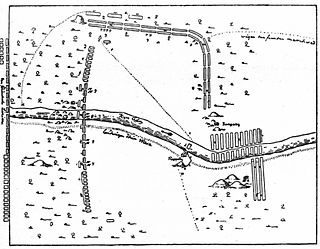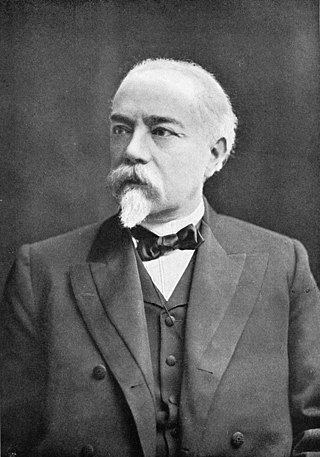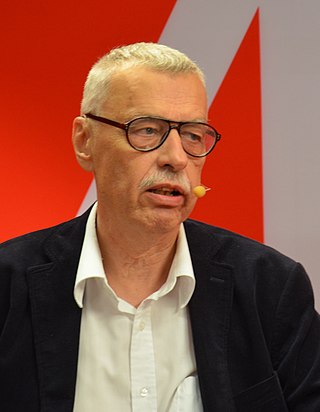
Carl-Michael Edenborg, born 1967, is a Swedish writer, critic, editor, publisher and historian of ideas and literature.

Albert Ulrik Bååth, often mentioned as A.U. Bååth was a Swedish poet, translator, lecturer and author. He was a senior lecturer in Old Norse literature at Gothenburg University College from 1881 until 1911. He was the brother of Cecilia Bååth-Holmberg.

Carina Burman is a Swedish novelist and literature scholar. Her research has been focused on Swedish 18th and 19th century literature. She completed her Ph.D. in literature in Uppsala in 1988 with a dissertation on the Gustavian writer Johan Henric Kellgren. Later production includes a critical edition of previously unpublished letters of the novelist and feminist pioneer Fredrika Bremer in two volumes (1996) and a biography of Bremer (2001).

The Battle of Napue or the Battle of Storkyro / Isokyrö was fought on 19 February 1714 (O.S.) / 2 March 1714 (N.S.) at the villages of Napue and Laurola in the Isokyrö parish of the Swedish Empire between the Swedish Empire and the Tsardom of Russia. It was the final land battle of the Finnish campaign in the Great Northern War. The Swedish detachment, consisting almost entirely of Finnish troops, were defeated by the numerically superior Russian force. As a result, all of Finland fell under Russian military occupation for the rest of the War; a seven-year period of hardship known in Finland as the Great Wrath.
Sven Rydenfelt was a Swedish economist and political writer known for his libertarian views.
Catharina Ahlgren was a Swedish proto-feminist poet and publisher, and one of the first identifiable female journalists in Sweden.
Margareta Hedvig Alströmer, as married Cronstedt af Fullerö, was a Swedish painter and concert singer. She was a member of the Royal Swedish Academy of Arts and of the Royal Swedish Academy of Music.

Adolf Ludvig Gustav Fredrik Albert Badin, known as Badin, was a Swedish court servant (Kammermohr) and diarist. Originally a slave, he was the foster son and servant of Queen Louisa Ulrika of Sweden and a servant to his foster sister Princess Sophia Albertine of Sweden. His original name was Couchi, but he was commonly known as Badin.
Swedish folk music is a genre of music based largely on folkloric collection work that began in the early 19th century in Sweden. The primary instrument of Swedish folk music is the fiddle. Another common instrument, unique to Swedish traditions, is the nyckelharpa. Most Swedish instrumental folk music is dance music; the signature music and dance form within Swedish folk music is the polska. Vocal and instrumental traditions in Sweden have tended to share tunes historically, though they have been performed separately. Beginning with the folk music revival of the 1970s, vocalists and instrumentalists have also begun to perform together in folk music ensembles.

Kari Valtteri Tarkiainen is a Finnish historian and archivist, who served as the national archivist of Finland 1996–2003. He is a grandson of the scholar Viljo Tarkiainen and his wife, writer Maria Jotuni.

Dick Walther Harrison is a Swedish historian. He is currently a Professor of History at Lund University.
The titles Hovsångare for men and Hovsångerska for women are awarded by the Swedish monarch to a singer who, by their vocal art, has contributed to the international standing of Swedish singing. The formal title was introduced by King Gustav III of Sweden in 1773, with the first recipients being Elisabeth Olin and Carl Stenborg. The position as such, however, dates back to the 17th century, when Anne Chabanceau de La Barre and Joseph Chabanceau de La Barre were singers at the court of Queen Christina of Sweden.

Carl David af Wirsén was a Swedish poet, literary critic and the Swedish Academy's permanent secretary 1884–1912.

Socken is the name used for a part of a county in Sweden. In Denmark similar areas are known as sogn, in Norway sokn or sogn and in Finland pitäjä(socken). A socken is an rural area formed around a church, typically in the Middle Ages. A socken originally served as a parish. Later it also served as a civil parish or an administrative parish, and became a predecessor to today's municipalities of Sweden, Finland, Norway and Denmark. Today it is a traditional area with frozen borders, in Sweden typically identical to those of the early 20th century rural parishes. The socken also served as a registration unit for buildings, in Sweden recently replaced by identical districts as registration unit. A socken consists of several villages and industry localities, and is typically named after the main village and the original church.

Compulsory sterilisation in Sweden were sterilisations which were carried out in Sweden, without a valid consent of the subject, during the years 1906–1975 on eugenic, medical and social grounds. Between 1972 and 2013, sterilisation was also a condition for gender reassignment surgery.

Hilda Augusta Amanda Kerfstedt, née Hallström, was a Swedish novelist, playwright and translator. She was a popular and noted writer in late 19th and early 20th century Sweden, and participated in public debate. She was also engaged in the movement for women's rights, and active in the Fredrika Bremer Association and Married Woman's Property Rights Association. As a feminist, she focused on the debate around sexual equality, and was critical to the contemporary sexual double standards for men and women. As such, she was one of the participants in the Nordic sexual morality debate, the public debate in Swedish papers, books and plays, which took place during the 1880s. Kerfstedt was a member of the women's association Nya Idun and one of its first committee members. She was the editor of the feminist paper Dagny, the publication of the Fredrika Bremer Association, in 1888–1891. She was especially noted within the debate on children's literature.

Per Svante Gudmund Nordin is a Swedish historian of ideas and author. He is a professor of history of ideas at Lund University.
Lars Jakob Vilhelm Burman, born April 1, 1958, is a Swedish professor of Literature at Uppsala University, director of Uppsala University Library, and inspector at Värmlands nation.

Hans Wilhelm Kristofer Agrell is a Swedish writer and historian within the area of peace and conflict studies. His authorship has mostly focussed on Swedish foreign, security and defence policy during the Cold War.

Admiral Bror Per Harald Stefenson was a Swedish Navy officer. Stefenson's senior commands include Chief of the Defence Staff and military commander of the Eastern Military District as well as Commandant General in Stockholm. He also served as Chief of His Majesty's Military Staff. As of 2023, Stefenson remains the last appointed Swedish admiral.














